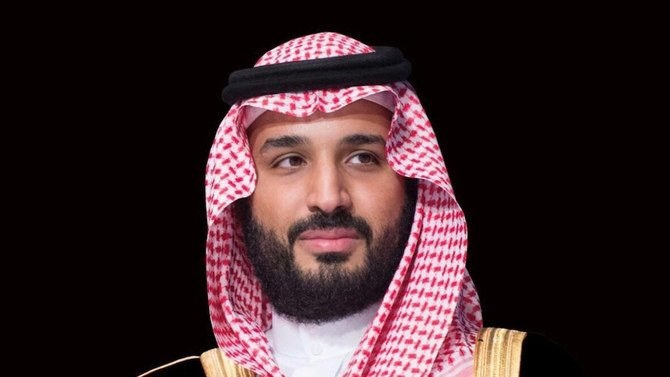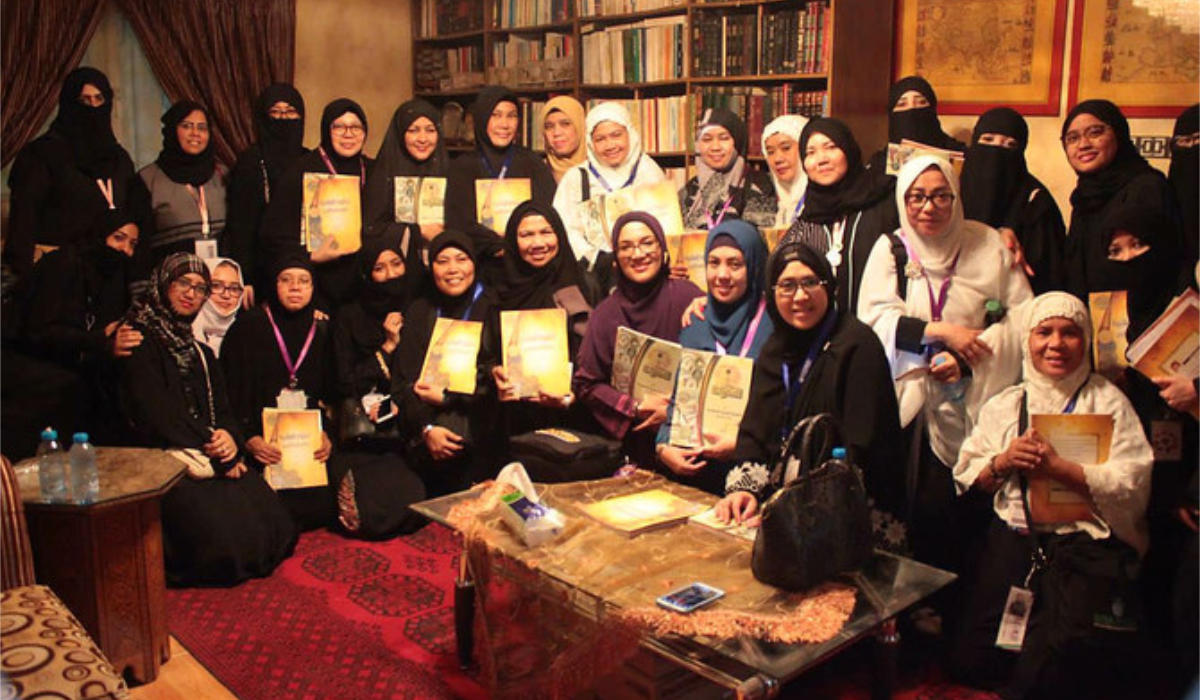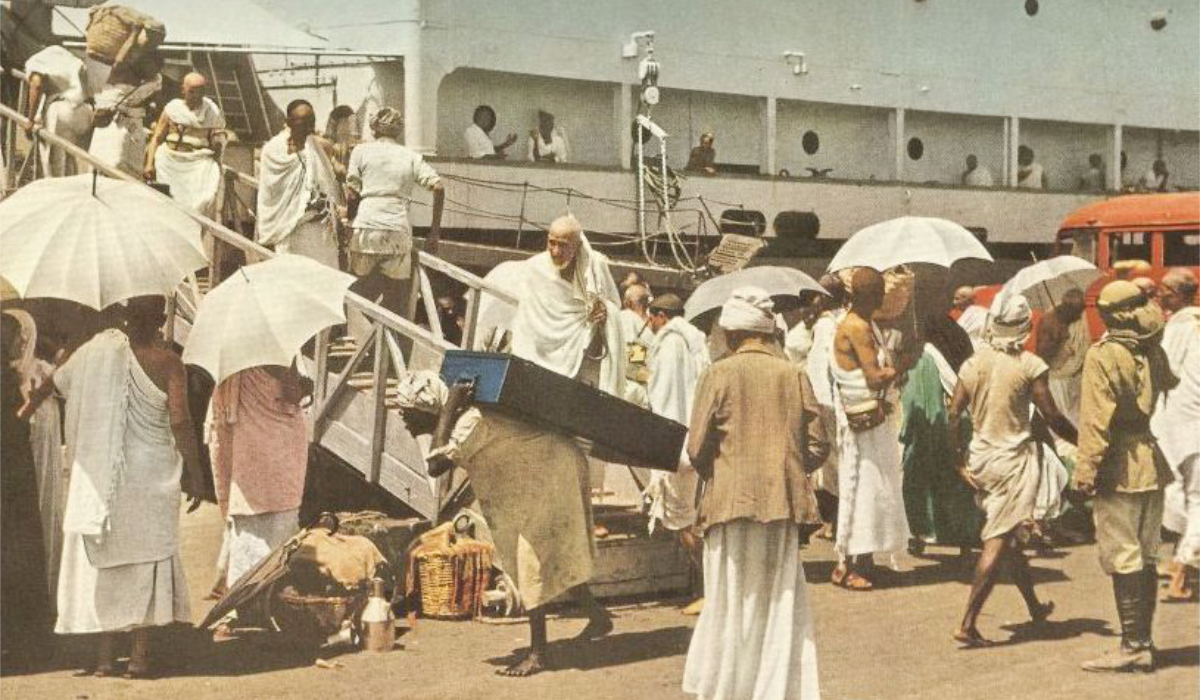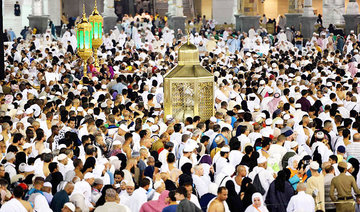RIYADH: Saudi Arabia’s Crown Prince Mohammed bin Salman has directed SR3.74 million ($997,080) to be distributed as marriage grants to 200 young men and women across the Kingdom.
The money comes out of his “keenness to support orphans with special circumstances and people with disabilities, as they are among the priority groups of the ‘SNAD Mohammed bin Salman’ program,” Saudi Press Agency reported.
In 2019, the crown prince provided SR520 million to more than 26,000 people across the Kingdom under the same scheme. They also received a training course in financial awareness.
Saudi crown prince allocates $1 million as marriage grants for 200 men and women
https://arab.news/vdna6
Saudi crown prince allocates $1 million as marriage grants for 200 men and women

- Young Saudis also received a training course in financial awareness
Makkah locals welcome blessings of the spiritual season

- Hajj invites millions to the holy city where locals show deep-rooted Saudi hospitality
RIYADH: During the sacred days of Hajj, Makkah witnesses an influx of pilgrims and locals themselves engage more fervently in Islamic practices such as prayer and fasting.
Sami Al-Alwani, a local citizen, enjoys the spiritual aspects of the pilgrimage and says the Hajj season is unlike any other month.
“This annual tradition of welcoming, joy and enthusiasm with which we receive the pilgrims of the House of God is passed down from generation to generation,” he told Arab News.

The arrival of pilgrims also means a peak in economic activity and boost for local employment.
Al-Alwani added: “One significant economic aspect we notice is the full occupancy of hotels, leading to a noticeable economic boost in restaurants and services.
HIGHLIGHTS
• Locals of Makkah, including young men and women, volunteer through available programs to assist and guide pilgrims.
• The sacred time of Hajj also brings forth the deep- rooted compassion and friendliness that are hallmarks of the people of Makkah.
“We have numerous job opportunities during Hajj to assist pilgrims and work with them in Mina, Arafat, Muzdalifah and the train station. We also serve as their supervisors and assist them in completing their Hajj obligations. Many volunteers, including young men and women from Makkah, participate voluntarily through available programs.”

Al-Alwani added pilgrimage routes and traffic patterns in recent years had had no negative effects for Makkah’s population.
Wejdan Buqas is a female mutawwif — someone who leads pilgrims in the traditional rites and prayers of Hajj and Umrah — who says she used to offer to drive people to Mount Hira and other holy locations.
“Back in the 1980s, we used to greet pilgrims, let them stay in our homes, and transport them to the Al-Tanaim Mosque, Al-Maala Cemeteries, and Hira Mountain. We used to also take them to private, tiny museums that highlighted Makkah inhabitants’ customs, such as telling them about our Eid celebrations,” she said, adding such activities were now streamlined by the government.
Due to the high volume of pilgrims, nearby companies and service providers were set up to meet their needs by providing lodgings, transportation, medical care, and guidance. The sacred time of Hajj also brings forth the deep-rooted compassion and friendliness that are hallmarks of the people of Makkah.
Bakur Hemdi is a Makkah native from a long lineage of muttawifs, including his grandfather and father. He followed in their footsteps and took up the role when he was 21 years old.
“As a mutawwif, my role goes beyond just guiding the pilgrims through the rituals and ceremonies of Hajj and Umrah,” he said.
“I’m a cultural ambassador, helping them navigate the intricacies of Makkah’s landscape and ensuring they can fully immerse themselves in the spiritual journey they’ve come to undertake.”
He added: “Through my interactions with pilgrims from diverse backgrounds, I've gained a deep appreciation for the richness of their traditions and the shared devotion that unites them in their pursuit of spiritual enlightenment. I take great pride in upholding the legacy of my ancestors, while also adapting to the evolving needs of modern-day pilgrims.”
Hayat Eid, who also comes from a family of mutawwifs, said everyone in Makkah mostly worked during Hajj or, if not, they traveled.
“We make a profit of a whole year during Hajj season, so many people will not miss that opportunity,” she said. “We also remark to each other, ‘Hajj wala dajj?’ which translates to ‘Are you working in Hajj or are you fleeing?’ which is a humorous statement.”
She added many women participated by preparing treats like maamoul cookies and date cakes to share during Eid.
Every activity contributes to the Hajj season, a time of great spiritual significance and community engagement for the residents of Makkah who play a crucial role in hosting and supporting the millions of Muslims who come to perform this important religious duty.
Hajj: An odyssey of faith and personal growth

- Pilgrimage fosters spiritual renewal, community bonds, experts say
MAKKAH: The journey of Hajj, representing the fulfillment of the fifth pillar of Islam, is a chance for personal transformation, fostering patience, resilience, endurance, solidarity and cooperation.
These virtues can positively impact an individual’s life long after completing the pilgrimage.

Before arriving in Saudi Arabia, many pilgrims sell valuable possessions such as properties and homes to fulfill this obligatory act of worship, which Muslims must perform if they are able.
Abeer Al-Jasser, a Syrian pilgrim from Deir Ezzor, said that she has waited many years to perform Hajj. She highlighted her commitment to fulfilling all Hajj rituals meticulously, hoping to emerge with renewed vigor and a new outlook on life.

She described the pilgrimage as an exceptional spiritual opportunity that enhances closeness to God, increasing faith and providing tranquility and peace. “Performing the rituals is seen as a chance to purify oneself from sins, offering psychological relief and freedom from past burdens.
“The sight of Muslims in white attire, symbolizing equality and unity, brings comfort and peace. Witnessing this profound sense of brotherhood, with people from all over the world united for one purpose, is a deeply moving experience,” Al-Jasser said.
Witnessing this profound sense of brotherhood, with people from all over the world united for one purpose, is a deeply moving experience.
Abeer Al-Jasser, Syrian Hajj pilgrim
She added that Hajj has numerous positive effects on health, family and community, and it encourages self-assessment and goal-setting, aiding personal growth and decision-making.

“The pilgrimage also teaches the spirit of cooperation, helping others, and respecting and valuing others, fostering humility and discouraging selfishness,” she added.
Pilgrims may experience deep inner peace and satisfaction after completing the ritual — feelings that can last long after returning home, she said.

For many, Hajj is not just a religious duty, but a also psychological journey that restores balance and enhances well-being. Psychological consultant Abdulrahman Al-Zahrani told Arab News about the positive psychological impacts of Hajj, describing it as a road map for Muslims to reassess their relationships with God, their community and their families.
The pilgrimage offers a historical opportunity for “spiritual healing and conscience cleansing,” he said.

Although pilgrims may be physically exhausted from the journey, Hajj provides a form of “psychological cleansing that momentarily frees them from worldly concerns,” Al-Zahrani added.
“Facing the challenges of travel and performing rituals in potentially difficult conditions teaches patience and resilience, which positively influence daily life. Moreover, the values of cooperation and solidarity learned during Hajj are significant,” he said.

Religious rituals such as standing at Arafat offer pilgrims a chance for deep reflection, potentially leading to fundamental changes in their mindset and life perspective,” Al-Zahrani said.
“Witnessing and appreciating the hardships faced by others can deepen the pilgrims’ gratitude for what they have, and participating in Hajj with a diverse group of Muslims fosters mutual understanding and cultural tolerance, building bridges of respect and brotherhood.

“This journey can also help heal emotional and psychological wounds, with sacred sites and religious rituals providing solace and healing.”
Psychologist Ahmed Al-Zamel told Arab News that many pilgrims return from Hajj a strong intention to improve their behavior and align their lives more closely with religious and ethical teachings.
“The experience of standing in holy places and contemplating life and death instills deep humility and reverence for God, enhancing individual spirituality,” he said.
The Hajj pilgrimage may also strengthen family bonds, as many pilgrims perform Hajj with relatives, creating shared memories and strengthening family ties,” he added.
“Pilgrims often experience inner peace after completing the pilgrimage, learning forgiveness and compassion, and enhancing personal and social relationships.”
Mutawwif Nader Osama described Hajj as an inspirational spiritual journey. “Upon returning, pilgrims often have a positive impact on their communities, inspiring others with the positive changes they have made in their lives and encouraging them to improve their behavior and actions,” he said.
Many pilgrims turn to charitable work and helping others, driven by the values instilled during the pilgrimage, he added.
“Their experiences of equality and unity among people of different races and nationalities during the pilgrimage encourage them to appreciate and celebrate the human values consistently promoted by Islam,” Osama added.
Saudi pavilion at defense exhibition in Paris showcases achievements of Kingdom’s military sector

- The installation reflects commitment to advancement of national military capabilities and pursuit of international partnerships
RIYADH: The achievements of Saudi Arabia’s military sector are being celebrated this week by the country’s pavilion at Eurosatory 2024, an international defense and security event in Paris.
The installation reflects the Kingdom’s commitment to advancing its military capabilities and fostering international partnerships, officials said.
It was inaugurated by Ahmad Abdulaziz Al-Ohali, governor of the General Authority for Military Industries on Monday, the opening day of the five-day event in the French capital. Other Saudi dignitaries in attendance included the assistant minister of defense, Talal Al-Otaibi, and the ambassador to France, Fahd Al-Ruwaili.
Al-Ohali was briefed on the exhibitors at the Pavilion, including Saudi Arabian Military Industries, Saudia Technic, Life Shield for Military Industries, Scopa Industries, Arabian International Co. for Steel Structures, Saudi Leather Industries Co., Al-Esnad for Military Supplies, Khidmat Ray Manufacturing Co., and the biennial World Defense Show in Riyadh, which will next take place in February 2026.
He highlighted the strategic significance of the Saudi participation at an event described as the largest international exhibition devoted to land and air defense and security, and the Kingdom’s desire to attract investment and forge international partnerships.
Saudi authorities aim to localize more than half of their military spending by 2030, with the support of the General Authority for Military Industries and its partners from the public and private sectors.
Many Hajj pilgrims begin final rituals before returning home

- More than 1.8m have performed Hajj this year
MINA: Hundreds of thousands of this year’s total of more than 1.8 million Hajj pilgrims began performing the final rituals of their pilgrimage early on Tuesday morning before preparing for the return home.
Many began stoning the pillars in Mina at noon on Tuesday and then headed to the Grand Mosque to perform the final ritual of circumambulating the Kaaba seven times, known as Tawaf Al-Wadaa, concluding their pilgrimage.
However, those who remain in Mina until sunset on the second day of Tashreeq are required by Islamic teachings to stay for a third day before leaving Makkah.
Speaking to Arab News, Aminatu Haruna, a Nigerian pilgrim, said she will be leaving Makkah on Tuesday to return to her homeland after completing Hajj with her two children.

Talking about the services provided to pilgrims, she said: “All I can say is Alhamdulillah (thank God).
“The Saudi government is really trained, and we have seen so many improvements. They introduced electric cars and scooters. Of course, all the officials, when I stopped to ask them, were always there to help.”

Doran Ahmed and Gina Amin, an Iraqi Kurd couple, were also planning to leave Mina on the same day after fulfilling the stoning ritual.
Ahmed and Amin expressed their gratitude to the Kingdom for preparing Hajj in a “great and seamless way, without any problems.”
They told Arab News: “Today, we bid farewell to this blessed land.”

Many pilgrims, after completing their farewell tawaf, journey to Madinah to pray at the Prophet’s Mosque and visit the city’s numerous Islamic landmarks.
Security staff and Hajj and health officials have confirmed that all their plans were successfully carried out, and no pandemic diseases were recorded.

According to the Ministry of Hajj and Umrah, more than 170,000 personnel have served the 1,833,164 pilgrims who performed Hajj this year. Of these, more than 1.61 million came from over 200 countries worldwide.
About 40 million bottles of Zamzam water had been served to pilgrims up to Monday, while 300 food supply contractors had provided 9 million daily meals.

Meanwhile, the Presidency of Religious Affairs of the Grand Mosque and the Prophet’s Mosque had been preparing to welcome pilgrims arriving to perform the farewell tawaf to complete their Hajj rituals.
A comprehensive package of services had been prepared, including guidance, field awareness, educational lessons, initiatives, and enriching religious activities for pilgrims, according to the Saudi Press Agency.

The Haramain Presidency has painted white more than 11,000 sq. meters of the areas adjacent to the Grand Mosque, using materials which help to reduce the temperature at the site for pilgrims.
This fast-drying chemical can be used both indoors and outdoors, on asphalt or concrete surfaces. The paint used at the mosque reflects sunlight and mitigates the effects of climate change, helping to provide a more comfortable environment for waiting, walking, and gathering.
The temperature in Makkah and Mina reduced from nearly 49 C to 38 C on Tuesday morning, according to a report by the National Center for Meteorology.
Islamic affairs ministry starts distributing over 1.8 million copies of Qur’an to departing Hajj pilgrims

- The copies, printed by the King Fahd Complex for the Printing of the Holy Qur’an, are available in various sizes
RIYADH: Saudi Arabia’s Ministry of Islamic Affairs, Dawah, and Guidance has started distributing 1,879,352 copies of the holy Qur’an to departing Hajj pilgrims, Saudi Press Agency reported.
The copies, printed by the King Fahd Complex for the Printing of the Holy Qur’an, are available in various sizes.
Translations of the holy book are available in more than 77 languages, a testament to the ministry’s commitment to inclusivity and respect for all pilgrims departing for their home countries via King Abdulaziz International Airport, Jeddah Islamic Port, and other crossings.
Hajj 2024 ended on Tuesday and some pilgrims have started departing for their home countries having visited Madinah before the pilgrimage.




















